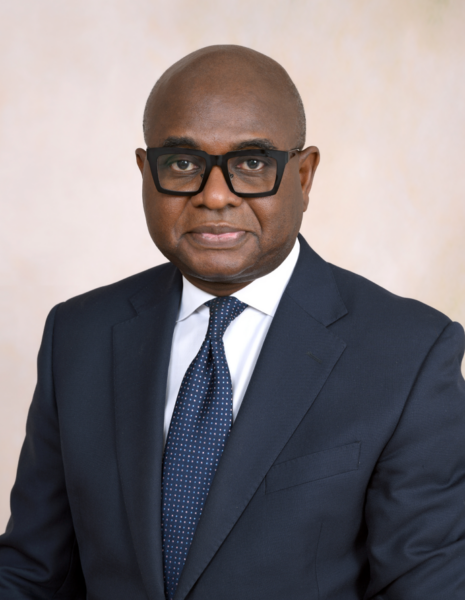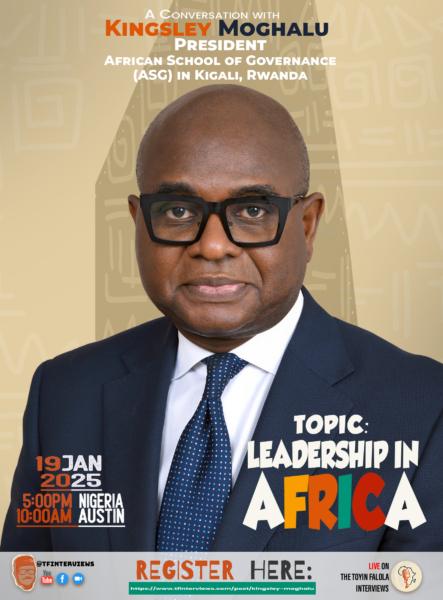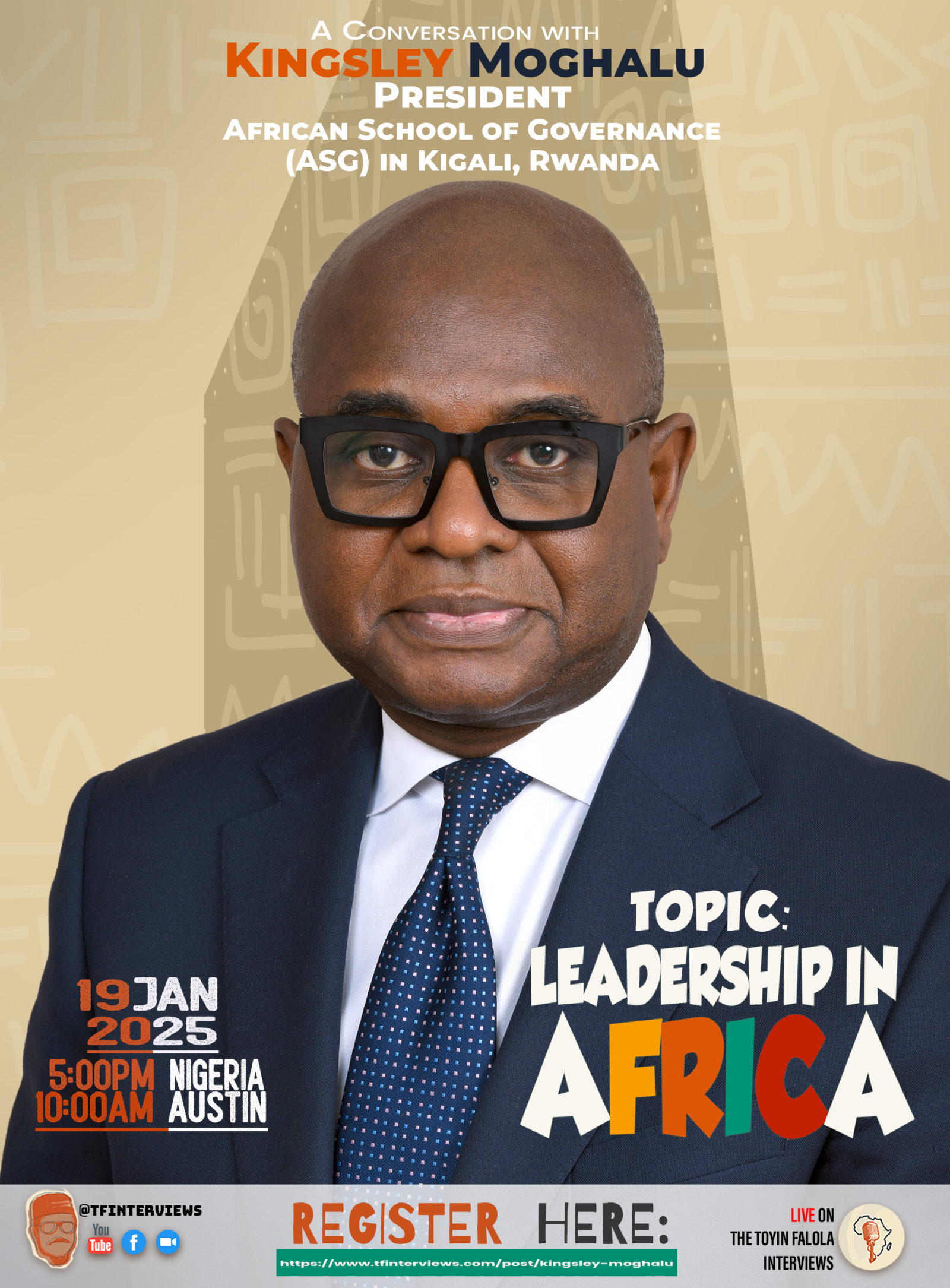Toyin Falola
Across every African culture, there is a central belief system that human destiny is preternaturally designed, and I found compelling a presupposition that comes with this understanding. Whether destiny is genuine or otherwise is left in the confines of holders of spiritual traditions to debate or determine. But here, I am particularly interested in the underlying assumptions accompanying the acceptance that there is destiny. Destiny shows that human knowledge is limited, for no human, whether dead or alive, is recorded to have the foreknowledge of the content of their destiny. In essence, our awareness about the existence of destiny and the ignorance of the content within thus become two interesting sides of a coin that contradict yet complement each other. How could we have known that a presidential candidate in Nigeria would end up in Kigali, Rwanda, as the President of the African School of Governance? This is destiny!

Today, I am not dabbling into a philosophical debate about the phenomenon; instead, I will say something about the human power in forging a destiny that unravels itself the more one lives one life. Interestingly, Dr. Kingsley Moghalu is the data I will examine for intellectual richness. I picked a particular interest in him because today, he has become a success and is evidence of dedication and determination to one’s aspirations. He has become a household name in Nigeria, gradually penetrating the world with fantastic dexterity. For his countless undertakings, he has showcased how hard work beats talent, especially when talent refuses to work hard. To be candid, his success is not a fluke, for there is a systematic process to accomplish everything he has performed in life.
It would be difficult to associate his success with anything but talent and hard work, especially when you understand that he is thriving in a professional landscape for which he had a different beginning. It is interesting to know that Dr. Moghalu began his educational journey as a legal professional after obtaining a law degree from the University of Nigeria, Nsukka. After this, his postgraduate education in international relations was the game changer because it is evident that it was the beginning of his understanding of international politics and how humans operate to position themselves for global relevance. It is public knowledge that this exceptional individual came to stardom in Nigeria, having put his ideas into action and ethical behaviour, which ultimately brought about the implementation of values on which his trajectory of greatness was founded. After he had amassed substantial professional experience and improved himself in various areas, he rose through the ranks to become a deputy governor of the apex bank in Nigeria, the Central Bank of Nigeria. It should be mentioned here that the arrival at this position signals one’s ingenuity and the ability for coordination and organization. During his tenure in this position, he brought an essentially different perspective to the operation of the Bank. He assisted in situating the country’s economy within the appropriate trajectory for global economic development. Unsurprisingly, Nigeria experienced transcendental development when he was deputized as a deputy governor of the bank institution.
I remind you that Dr Moghalu not only succeeded in the Central Bank of Nigeria; he is also a solid academic of practice who dished knowledge to the community of intellectuals seeking to increase its ideas and understanding of the operation of their professional field. For several years, he taught as a professor of practice in international business and public policy, where he made a remarkable impact. His insight into the formulation of policies has garnered sufficient interest from people across the globe, for he has a particular understanding of how several things work in global politics, and his ability to convey this knowledge through teaching is unparalleled. He, therefore, has won the admiration of many, and youths across the country and even the continent have found in him beneficial inspiration for making their own decisions and shaping their destiny. He demonstrated that he is like Oliver Twist and would continue to strive for more when he showed an interest in piloting the country’s affairs in 2019. To have contested for the position of President in Nigeria demonstrates a high level of confidence, not because contesting for an electable position itself is a strange engagement but because it requires the ability to have a clear understanding of the underlying responsibilities and the readiness to make the necessary changes. This is inescapable given that Nigeria is the “Giant of Africa” and the centre point of the black man’s relevance in global politics. At this time, people began to appreciate the magnitude of his intellectual resilience.

It is a matter of destiny that he has been given an immense responsibility in his life, the recent one of which is his appointment as the President of the African School of Governance. I should make some comments about that establishment itself. Over time, African leaders have become aware that the depth of leadership innovation and creative representation is waning significantly, especially when we enter the 21st century. Many people in positions of power have found themselves bereaved of ideas needed to transform the continent and make it an enviable site of innovative ideas and technology, as well as drive for the good of the continent primarily and the betterment of the world.
A shortage of transformational leaders who can think critically would ultimately make it difficult for Africa to meet global expectations and, much less embrace the responsibilities that would help it compete with other parts of the world. In that case, having un-creative leaders in the seat of power in Africa will complicate things rather than bring them any respite. Essentially, it behoves thinkers among them to evolve and usher into existing practices and engagements that would facilitate accomplishing their objectives as a continent so that they would not continue to be a dumping site for imperial ambitions.
Meanwhile, Africa has realized that to surmount the perennial problems of insecurity, economic despondency, and technological underdevelopment, they would need to create an ecosystem of learning for aspiring leaders who would take the bull by the horns. It is believed that unless they make this uncomfortable decision, they may remain eternally in the dungeon of retrogression, making it impossible for them to stand tall and challenge the dominance of others who are hellbent on extracting their human and natural resources. It becomes very clear, therefore, that the appointment of Professor Kingsley Moghalu as the President of the African School of Governance is geared towards the implementation of ideas that would help groom African leaders who can drive sustainable development in the continent by providing policies that are of global best practices. There, it would be easy to produce a chain of policies that would, among other things, see to the geometrical increase of African economic and political values, which influence would be felt across different parts of the globe.
Dr. Moghalu is considered necessary in achieving this task because he has demonstrated that he can manage people of diverse cultural and political backgrounds, and that explains why he triumphs everywhere he is assigned to function in one capacity or another. It cannot be overemphasized that his exemplary leadership would bring desirable results for Africa. As a Nigerian, he would bank on the richness of his intellectual attainment to provoke needed transformation at that level. As Africans, we cannot but be proud of what he has achieved with his talent and how he continually proves that humans are themselves accorded a substantial role in shaping their destiny. This may be why some cultures in Nigeria emphasize the place of human input in moulding their lives or creating the atmosphere where they would thrive. As Africans, we cannot thank him enough for his imaginative role in reshaping our paths toward positive transformation.
Please join us for a conversation with Kingsley Moghalu, President of the African School of Governance (ASG) in Kigali, Rwanda.
Sunday, January 19, 2025
5 PM Nigeria
10 AM Austin
6 PM Rwanda
Register Here:
https://www.tfinterviews.com/post/kingsley-moghalu
Join Via Zoom:

Prof . Toyin Falola has unveiled , in his characteristic manner , Prof . Kingsley Moghalu for his imaginative role in reshaping our paths toward positive transformation . There is absolute need for a paradigm shift in governance architecture and archestructure in African Continent . We need to train/raise a new generation of leaders in the continent .